5 Unexpected Side Effects Of Decaf Coffee You Must Be Aware Of
Yes! Not just caffeine but even decaf can cause harm if not used in moderation.

Image: Created with Dall.E
Many of us start our day with a hot cup of coffee. But if caffeine isn’t suitable, decaf coffee is an alternative most consume. However, it is important to be aware of the side effects of decaf coffee. Contrary to popular opinion, it doesn’t lead to dehydration or increased heart rate, but there are still some side effects.
 Know The Flip Side: Decaf Coffee
Know The Flip Side: Decaf CoffeeShort-Term Effects
Acidity, headache, drowsiness, and gastric issues.
Long-Term Effects
May aggravate rheumatoid arthritis, and increase the risk of heart attack, and myocardial infarction.
Drug Interactions
May interact negatively with antidiabetic medications, anticoagulant drugs, asthma medications, and contraceptive drugs.
When To See A Doctor
Consult your doctor if you experience loss of consciousness, digestive issues, a quickening heart rate, extreme anxiety, nausea, or restlessness.
Consuming decaffeinated coffee in excess may increase the risk of heart attack and myocardiali A muscular tissue found in the heart. Shortness of breath and chest pains are symptoms of myocardial infarction. infarction (1).
It may seem like a safer alternative to coffee but has many adverse effects.
Continue reading to learn more about them.
In This Article
Decaf Vs. Regular Coffee
Decaf is often considered a safer alternative to regular coffee. To get more insight, let’s compare decaf coffee with regular coffee. This will elaborate on caffeine side effects and other critical information with a broader perspective.
| Aspect | Decaf Coffee | Regular Coffee |
|---|---|---|
| Caffeine Content | 2-5 mg per 8 oz cup | 70-140 mg per 8 oz cup |
| Stimulating effect | Less stimulating due to low caffeine | More stimulating due to higher caffeine |
| Taste | Slightly altered flavor; milder taste | Robust coffee flavor; bitter |
| Health Considerations | Suitable for caffeine-sensitive individuals, pregnant women, and those with any health concerns | Suitable for everyone except those with caffeine sensitivity |
| Varieties | Decaf versions of most coffee types, including decaf espresso and decaf drip coffee | A wide range of coffee types with varying levels of caffeine |
| Impact On Sleep | Less likely to disrupt sleep | May disrupt sleep if consumed in the evening |
| Availability | Available in various blends and flavors | Available in a wide range of blends and flavors |
| Cost | Expensive | Often more affordable |
To make an informed choice between regular coffee and decaf, it’s essential to understand how decaf coffee is made. Learn more in the next section.
Key Takeaways
- Caffeine sensitivity can lead to insomnia, jitteriness, and anxiety.
- Some people may have acidity from decaf coffee.
- Some people’s cholesterol levels may rise as a result of drinking decaf coffee.
- Those who are sensitive to caffeine may get headaches after drinking decaf coffee.
- Chemical byproducts of the decaffeination process may be present in some decaf coffee brands, which could be harmful to your health.
How Is Decaf Coffee Made?
Before we get to the ill effects of decaf coffee, it is important to understand how it is made and does decaf coffee have caffeine in it or not.
As the name suggests, decaffeinated (or decaf, in short) coffee is coffee with most of its caffeine removed (97% – to be precise). One serving of decaf coffee contains about 2 milligrams of caffeine, as opposed to 95 milligrams in regular coffee (2).
Caffeine is extracted from coffee beans through various methods. These include the use of organic solvents, water, or carbon dioxide (3). The solvent-based method uses chemicals like methylene chloride or ethyl acetate to remove caffeine, but some people worry about chemical residues. The Swiss Water Process is a chemical-free option that uses water to extract caffeine but may change the coffee’s flavor. Another method, the carbon dioxide process, uses high-pressure CO2 and is safe while preserving more natural flavors. The removal of caffeine and other compounds can also rob this coffee of its trademark taste (2). Those preferring decaf coffee seem to be okay with this, given its purported benefits. But some research also sheds light on the possible side effects of decaffeinated coffee.
 Trivia
TriviaWhat Are The Side Effects Of Decaf Coffee?
1. May Cause Heart Complications

Decaffeinated coffee might increase the levels of bad cholesterol (LDL cholesterol). These effects were not observed in the caffeinated variant (4). Decaf coffee was found to increase a specific blood fat that is linked to metabolic syndrome.
In another study, shifting from caffeinated to decaffeinated coffee did not decrease the risk of heart attacks (1).
A study published in the Annals of Epidemiology (1993) explored whether drinking decaffeinated coffee is linked to an increased risk of heart attacks in Italian women. Researchers analyzed data from 433 women with heart attacks and 869 hospital patients without cardiovascular or related conditions. They found that women who drank two or more cups of decaf coffee daily had a higher relative risk of heart attack compared to non-drinkers, though the association weakened after considering other health factors like diabetes and hypertension. The study concluded that caffeine is likely not a key factor in the relationship between coffee and heart attacks, and switching to decaf coffee may not reduce the risk (1).
Though decaffeinated coffee by itself may not be harmful, the chemicals used in the decaffeinating process could be. Methylene chloride, one such solvent used for the removal of caffeine, could be carcinogenici Any agent or substance that can lead to cancer. Some examples include tobacco, asbestos, and alcohol. (5).
Two cups of decaffeinated coffee a day could be safe in healthy individuals.
But as per the FDA, if you react strongly to caffeine negatively, avoid decaffeinated coffee (6).
Replacing regular coffee with the decaf variant may lower blood pressure, although in a small way (7).
2. May Aggravate Rheumatoid Arthritis

Consumption of decaf coffee was linked to an increased risk of rheumatoid arthritis (8). Surprisingly, caffeinated coffee did not pose this risk.
The underlying cause behind this could be the preparation and processing of decaffeinated coffee undergoes. Further research is needed to confirm this speculation (9).
3. May Cause Acidity

Decaf coffee was found to increase serum gastrin concentrations (10). Gastrin is the hormone that triggers the release of stomach acid. When this happens in excess, it may lead to symptoms of acidity (11).
However, regular coffee was found to cause more pronounced gastroesophageali It happens when the stomach pushes its contents back into the esophagus. It can be controlled by maintaining a healthy weight. reflux. This effect was mitigated when the coffee was decaffeinated (12).
4. May Interfere With Iron Absorption

Coffee, in general, contains chlorogenici This compound is naturally available in coffee beans and has antioxidant properties. It can also be found in apples, carrots, and pears. acid, and so does decaffeinated coffee. Chlorogenic acid was found to inhibit nonheme (plant-based) iron absorption (13).
5. May Cause Headache And Drowsiness
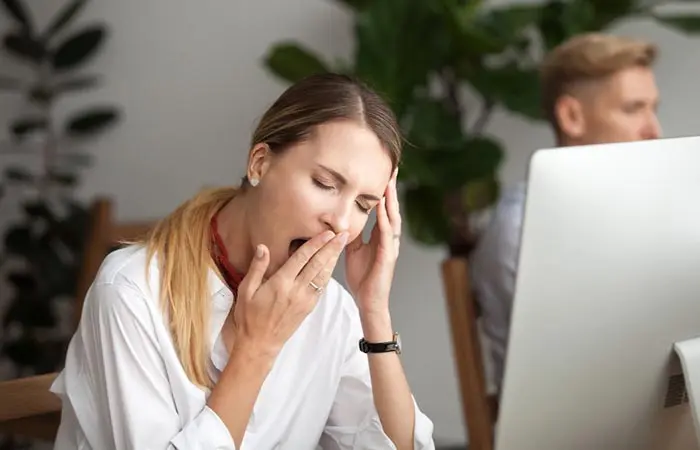
These could be more of withdrawal symptoms. Individuals who consume coffee regularly may often experience headaches, drowsiness, and even fatigue when given decaf coffee (14).
Eva De Angelis, Dietitian Nutritionist with a bachelor’s in Nutrition and Dietetics from ISalud University, says, “Caffeine can stimulate our central nervous system, and many of us rely on a morning coffee to kick start the day. You might experience some “withdrawal” symptoms when switching to decaf coffee due to the lack of caffeine. Suppose you’re used to having a regular intake of caffeine. In that case, you experience headaches, lethargy, depressed mood, and marked irritability when you switch to decaf, but only until your body gets used to the lack of caffeine.”
Paul Cantor, a blogger, documented his caffeine withdrawal and anxiety in his personal blog. He said, “My mind couldn’t shut off. I would be up late, awake early, never falling into a deep sleep (i).” He experienced disrupted sleep patterns due to excessive caffeine consumption, which prevented restorative rest.
Another possible concern could be the use of methylene chloride in the decaffeination process. Some research says the chemical can temporarily slow down the central nervous system, leading to headache, drowsiness, and nausea (15).
 Trivia
TriviaShould You Choose Decaffeinated Coffee?
For those weighing the pros and cons of caffeine, understanding the caffeine benefits can also provide valuable insights. Balancing the benefits with the potential side effects, whether from regular or decaf coffee, can help you make more informed choices about your coffee consumption.
It depends on what you are looking for. If you are required to restrict caffeine intake due to any reason, decaf coffee could be ideal.
But if you are extremely sensitive to caffeine, we do not recommend it. This also includes pregnant or lactating women and individuals dealing with anxiety or who have trouble sleeping (16).
According to Eva De Angelis, “Since decaf coffee only has very little amounts of caffeine, it does not cause anxiety.” But individuals who are sensitive to caffeine may experience anxiety-like symptoms like shaking and jitteriness.
If you are someone who experiences the side-effects of decaf coffee, the next section is for you. Read on.
What To Do If You Experience Side Effects
If you experience any adverse effects after consuming decaf coffee, it is important to take action promptly. Consider taking the following steps:
- Start by reducing your intake and monitoring your symptoms. If the side effects persist, consult a healthcare professional for guidance.
- In cases of severe reactions like rapid heart rate, extreme anxiety, nausea, or loss of consciousness, seek immediate medical attention.
Staying hydrated and consuming decaf coffee with meals can also help minimize gastrointestinal discomfort. However, if safety measures aren’t cutting it, you may consider some alternatives. We have discussed a few in the section below. Read on.
Alternatives To Decaf Coffee
For those who wish to avoid decaf coffee due to its potential side effects, there are several alternatives to explore. Herbal teas, such as chamomile or peppermint, offer a caffeine-free option with soothing properties.
Chicory root coffee, which mimics the flavor of coffee without the caffeine, is another excellent substitute. For those looking to maintain some caffeine in their diet, consider beverages with lower caffeine content, such as green or white tea.
Additionally, golden milk or turmeric lattes provide a comforting and healthful choice.
Infographic: Natural Decaf Coffee Recipe
Decaf coffee has gained a lot of focus in the coffee industry and has grabbed the attention of many health enthusiasts. While its side effects may make you think twice before choosing it, you should try natural decaf coffee if you want to restrict your caffeine intake. It is a healthy alternative to store-bought decaf coffee and almost mimics the taste of regular coffee.
The following infographic provides information about the preparation of natural decaf coffee. Check it out! Illustration: StyleCraze Design Team
Decaf coffee is the best alternative to your regular coffee without caffeine (97% of caffeine is removed). The high antioxidant and nutrient content of decaf may benefit your health. However, one must also be aware of the side effects of decaf coffee associated with its excessive consumption. It may cause heart complications by increasing bad cholesterol levels, aggravate rheumatoid arthritis and acidity, cause heartburn and acid reflux along with other digestive issues, interfere with iron absorption, and cause headaches and drowsiness. If you are extremely sensitive to caffeine, drinking decaf coffee is also not recommended. Limit the consumption of decaf coffee to avoid these adverse reactions.
Frequently Asked Questions
Is it OK to drink decaf coffee every day?
Eva De Angelis says, “Drinking decaf coffee every day is safe, and in fact, it can be beneficial. During the decaffeination process, decaf coffee loses up to 15% of the healthful antioxidants of coffee. Yet, it is still a great source of antioxidants in classic Western diets.
Moderate intakes of either regular or decaf coffee are associated with tons of health benefits. It is not only caffeine that is good for us. Other bioactive compounds, like polyphenols, diterpenes, and trigonelline, are also highly beneficial. They all have antioxidant properties and thus can protect DNA and cellular proteins from damage, reducing oxidative stress. This may aid in the prevention of diseases, such as heart disease, cancer, and type 2 diabetes.”
She adds “Some people question whether the decaffeination process is safe. One of the compounds used is methylene chloride, which, if inhaled, can cause headaches, lightheadedness, irritability, wheezing, or coughing. Yet, this process has not only been approved by the FDA, but it’s also highly regulated.” Because too much can lead to digestive issues and affect calcium absorption as discussed in this article. Therefore, it is recommended to limit intake to about 2 to 3 cups per day for safety. As always, it is best to listen to your body and consult with a healthcare professional if you have specific concerns.
Does decaffeinated coffee raise blood pressure?
“Since the caffeine content in decaf coffee is quite low, drinking decaf coffee is not linked with a rise in blood pressure. Caffeine is the compound responsible for the link between coffee and elevated blood pressure. Caffeine is a vasoconstrictor, so it shrinks blood vessels leading to high blood pressure. Yet, all the other beneficial compounds in coffee are known to protect blood vessels,” according to Eva.
Does decaf coffee cause inflammation?
Eva says, “In most people, coffee may help reduce inflammation. Yet, we’re all different; this might not be the case for some individuals. So, taking into account what’s your particular experience after drinking coffee is key. Although the research on decaf coffee is more limited, it seems to have the same general effects of reducing inflammation because it’s rich in other antioxidants with anti-inflammatory properties.
How much of decaffeinated coffee can you drink?
All types of decaffeinated coffee contain caffeine, although in less amounts. Drinking 5 to 10 cups of decaf coffee could accumulate the amount of caffeine found in 1 to 2 cups of regular, caffeinated coffee (17).
But this does not mean you can drink 5 to 10 cups of decaf coffee every day. Stick to 2 to 3 cups to be on the safe side.
Does decaf coffee make you poop?
Yes, it does – just like regular coffee. This is related to its ability to trigger gastric acid secretions. The stomach acid helps churn the food and move it quickly through the gut (18), (19).
Does decaf coffee cause inflammation?
No, coffee contains anti-inflammatory compounds, and so does decaffeinated coffee. It provides antioxidants and may, in fact, fight inflammation (20).
Can decaf coffee cause weight gain?
No, decaf coffee is virtually free of calories and does not lead to weight gain.
Discover the truth about decaf coffee and its impact on your health. Check out this eye-opening video and explore the potential risks and benefits of this popular beverage.
Personal Experience: Source
StyleCraze's articles are interwoven with authentic personal narratives that provide depth and resonance to our content. Below are the sources of the personal accounts referenced in this article.
i. I Switched to Decaf and Life is Suddenly Greathttps://paulcantor.medium.com/i-switched-to-decaf-and-life-is-suddenly-great-faf74de82f0e
References
Articles on StyleCraze are backed by verified information from peer-reviewed and academic research papers, reputed organizations, research institutions, and medical associations to ensure accuracy and relevance. Read our editorial policy to learn more.
- Decaffeinated coffee and acute myocardial infarction. A case-control study in Italian women
https://pubmed.ncbi.nlm.nih.gov/7921307/ - Get the facts about decaffeinated coffee
https://www.aboutcoffee.org/beans/decaf-coffee/ - Caffeine in coffee: its removal. Why and how?
https://pubmed.ncbi.nlm.nih.gov/10516914/ - Coffee caffeine and coronary heart disease
https://www.researchgate.net/publication/298987145_Coffee_caffeine_and_coronary_heart_disease - ACUTE EFFECT OF DECAFFEINATED COFFEE ON HEART RATE BLOOD PRESSURE AND EXERCISE PERFORMANCE IN HEALTHY SUBJECTS
https://www.ncbi.nlm.nih.gov/pmc/articles/PMC2625695/pdf/jnma00908-0085.pdf - Spilling the Beans: How Much Caffeine is Too Much?
https://www.fda.gov/consumers/consumer-updates/spilling-beans-how-much-caffeine-too-much - Effect of decaffeinated versus regular coffee on blood pressure. A 12-week double-blind trial
https://pubmed.ncbi.nlm.nih.gov/2680964/ - Coffee tea and caffeine consumption and risk of rheumatoid arthritis: results from the Iowa Women’s Health Study
https://pubmed.ncbi.nlm.nih.gov/11817612/ - Decaffeinated Coffee Increases Risk of Rheumatoid Arthritis
https://www.uab.edu/newsarchive/43984-decaffeinated-coffee-increases-risk-of-rheumatoid-arthritis - The acute effects of coffee and caffeine on human interdigestive exocrine pancreatic secretion
https://pubmed.ncbi.nlm.nih.gov/3575300/ - Gastric acid and gastrin response to decaffeinated coffee and a peptone meal
https://pubmed.ncbi.nlm.nih.gov/6894624/ - Effect of decaffeination of coffee or tea on gastro-oesophageal reflux
https://pubmed.ncbi.nlm.nih.gov/7918922/ - Inhibition of Iron Absorption by Coffee and the Reduced Risk of Type 2 Diabetes Mellitus
https://jamanetwork.com/journals/jamainternalmedicine/article-abstract/411511 - Effect of dose on the ability of caffeine to serve as a reinforcer in humans
https://pubmed.ncbi.nlm.nih.gov/11224118/ - Caffeine Effects on the Central Nervous System and Behavioral Effects Associated with Caffeine Consumption
https://www.ncbi.nlm.nih.gov/books/NBK202225/ - Caffeine–common ingredient in a diet and its influence on human health
https://pubmed.ncbi.nlm.nih.gov/22928360/ - Caffeine consumption
https://pubmed.ncbi.nlm.nih.gov/8603790/ - Does postprandial coffee intake enhance gastric emptying?: a crossover study using continuous real time 13C breath test (BreathID system)
https://pubmed.ncbi.nlm.nih.gov/19621729/ - Is coffee a colonic stimulant?
https://pubmed.ncbi.nlm.nih.gov/9581985/ - Coffee consumption and markers of inflammation and endothelial dysfunction in healthy and diabetic women
https://pubmed.ncbi.nlm.nih.gov/17023717/
Read full bio of Madhu Sharma
- Eva De Angelis is a Dietitian Nutrionist from Argentina. She specializes in food and nutrition education, and healthy cooking. She has a Bachelor’s degree in Human Nutrition and Dietetics from ISalud University, a postgraduate certificate in Nutrition, Gastronomy, and Health, a culinary diploma, and an intermediate-level technical degree in Food Science.
 Eva De Angelis is a Dietitian Nutrionist from Argentina. She specializes in food and nutrition education, and healthy cooking. She has a Bachelor’s degree in Human Nutrition and Dietetics from ISalud University, a postgraduate certificate in Nutrition, Gastronomy, and Health, a culinary diploma, and an intermediate-level technical degree in Food Science.
Eva De Angelis is a Dietitian Nutrionist from Argentina. She specializes in food and nutrition education, and healthy cooking. She has a Bachelor’s degree in Human Nutrition and Dietetics from ISalud University, a postgraduate certificate in Nutrition, Gastronomy, and Health, a culinary diploma, and an intermediate-level technical degree in Food Science.
Read full bio of Ravi Teja Tadimalla
Read full bio of Arshiya Syeda
Read full bio of Sindhu Koganti















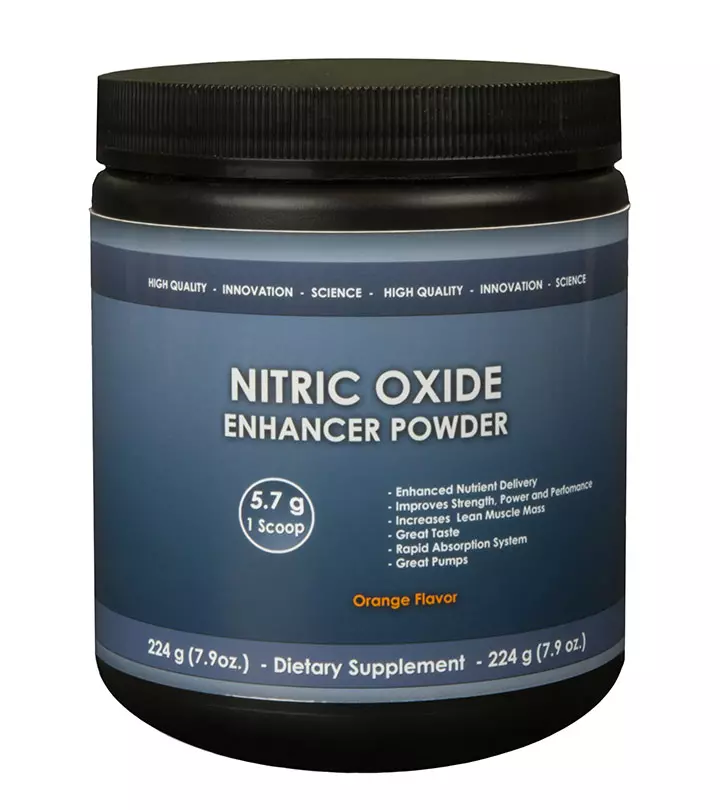





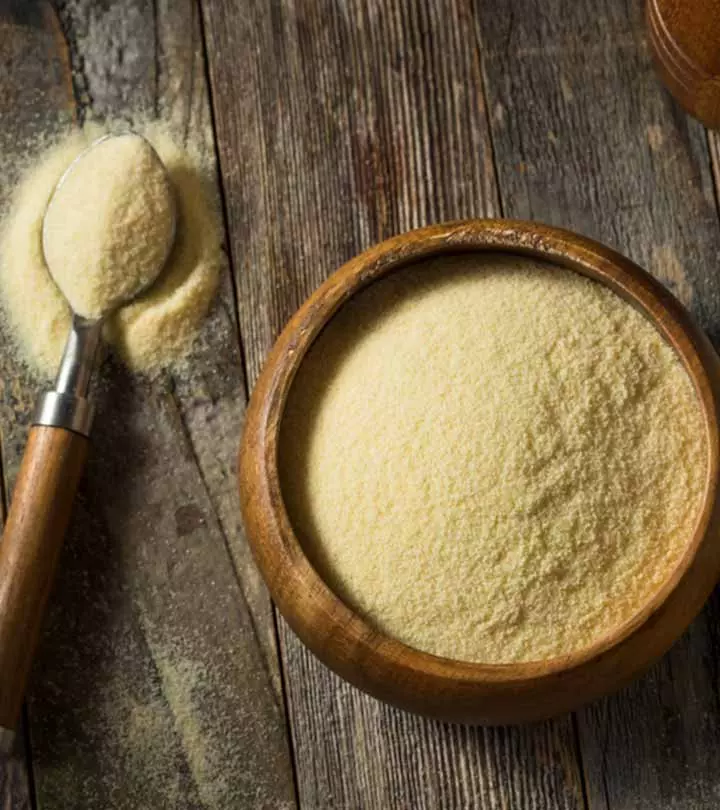
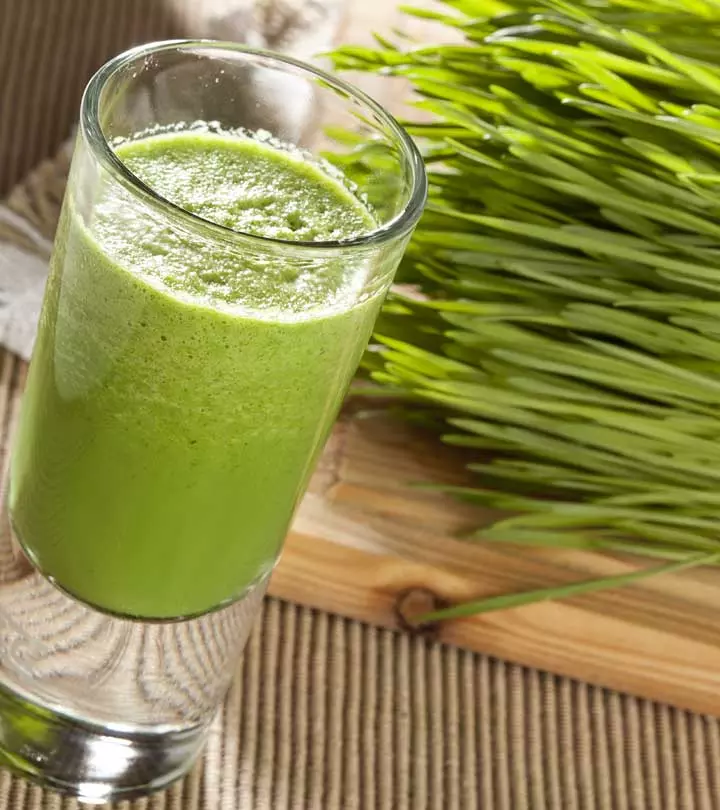
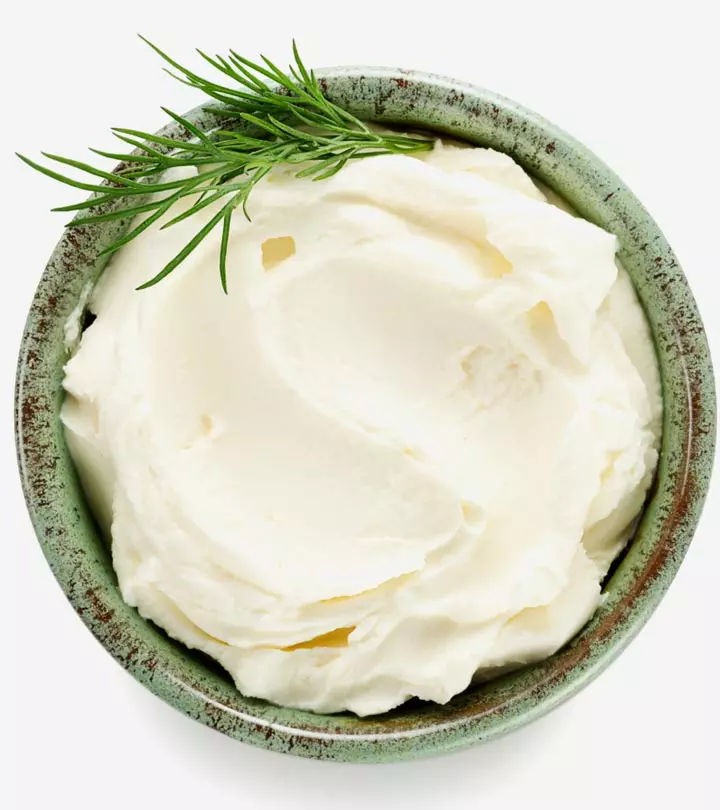


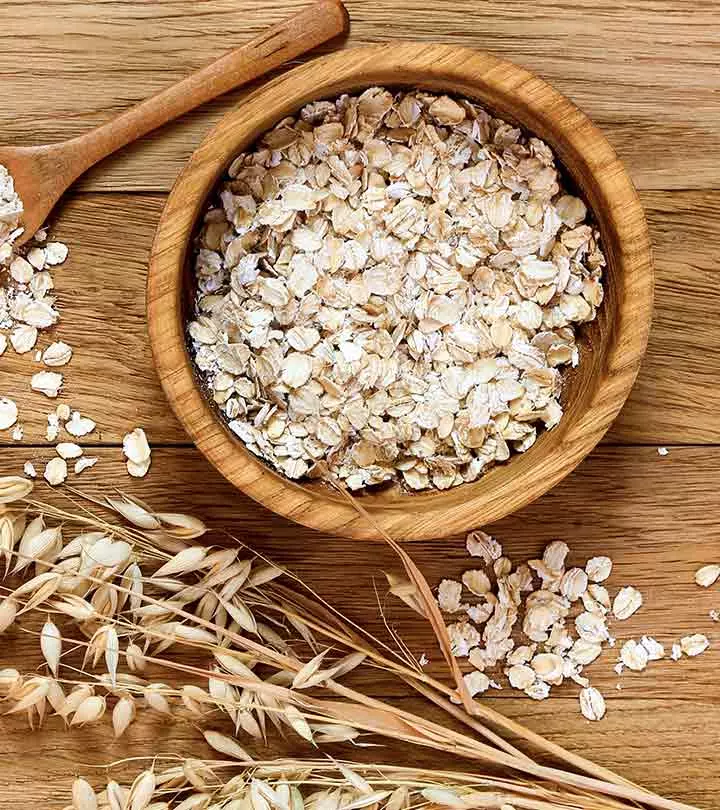
Community Experiences
Join the conversation and become a part of our empowering community! Share your stories, experiences, and insights to connect with other beauty, lifestyle, and health enthusiasts.